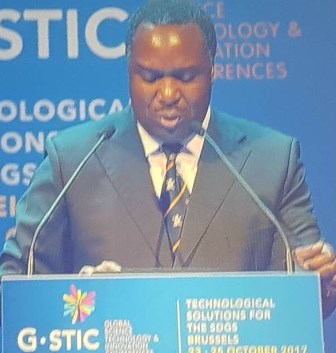Minister for Science, Technology and Innovation Dr Elioda Tumwesigye has asked other world leaders to focus on strengthening Science, Technology and Innovations (STIs) if they are to solve pressing societal challenges of which providing for growing populations is top.
“The strategic role of scientific innovation in uplifting other sectors of the economy such as Agriculture, Industry, Health, Energy, Education, Environment, and services and enhancing technological development, has been vividly highlighted in Uganda’s National Development Frameworks, the Innovation Strategy for Africa (STISA 2024), the Sustainable Development Goals (Agenda 2030) and the recently adopted Paris agreement on Climate change,” Tumwesigye said.
He was speaking at the Global Science, Technology and Innovation Conference (G-Stic), which is taking place in Brussels, Belgium.
It will run from October 23-25, 2017.
The G-STIC Conference series will bring together key stakeholders from science, technology and innovation communities (including the private sector), and provide a forum to review, discuss and identify internationally relevant technological innovations that can lead the world on a more sustainable development course.
The series is hosted jointly by: VITO (a Belgian research and technology organization on clean technology and sustainable development) and its international partners the Asian Institute of Technology, the Indian Institute of Technology and TERI (The Energy and Resources Institute).
Uganda’s population is now 40 Million but will be 101.8 Million by 2050. Africa will have 2.5 Billion by 2050 (World Population 9.8 Billion in 2050) when one in 4 people on this planet will be an African.
With the above figures, the minister says Africa faces a big challenge of providing enough food in quantity and quality to all growing population to prevent hunger and malnutrition.
“We need to use the best scientific knowledge and technological tool to assure food security for our people,” he said.
He lighllighted some of the major challenges as limited access to quality health services, climate change, poverty, malnutrition, limited access to clean water, good housing, quality education among other essentials of life.
Regarding health, Dr. Tumwesigye said: “We need to provide technological solutions to better fight common infectitious diseases such as TB, HIV, Malaria, Neglected Tropical Diseases (NTDs) as well as non-communicable diseases (Cancer, Cardio-vascular Diseases, Diabetes, trauma etc.,). We need to increase coverage to free health care.”
He also urged leaders to embrace the Green Revolution which introduced higher yielding strains of plants and new fertilizers.
It has so far operated successfully in India, Asia, the Middle East and Latin America but It has not penetrated deeply into sub-Saharan Africa.
Dr. Tumwesigye backed up his speech with a 2015 UNESCO Science Report, which observes that Science will be critical to meeting the challenge of sustainable development, as it lays the foundations for new approaches, solutions and technologies that enable us to identify, clarify and tackle local and global problems
